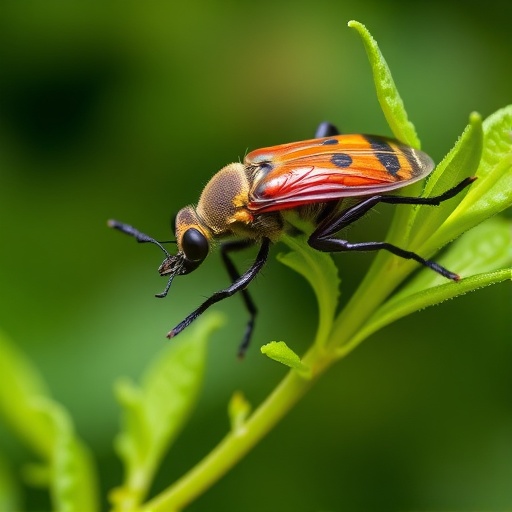In recent years, the struggle against insect pests has taken on a new dimension as scientists delve into the molecular and genetic intricacies underpinning insecticide resistance. A groundbreaking study led by researchers Biswas, Das, and Rahman, published in the journal Discover Sustainability, highlights the pivotal role that epigenetic mechanisms play in driving this resistance. Through unraveling the elaborate threads of DNA methylation and histone modification, this research presents compelling implications for sustainable pest management strategies across the globe.
The rise of pest resistance to commonly used insecticides presents a formidable challenge to agriculture, leading to significant crop losses and increased economic burdens for farmers. Traditional pest control methods, reliant on chemical insecticides, often fall short against resilient pests, prompting researchers to explore alternative approaches. By examining the epigenetic factors that contribute to resistance, the study sheds light on how these mechanisms can influence insects at a genetic level, offering new avenues for effective pest management.
DNA methylation, a key epigenetic modification, plays a crucial role in regulating gene expression without altering the underlying DNA sequence. This process involves the addition of methyl groups to the DNA molecule, leading to the silencing or activation of specific genes. Insects exposed to insecticides may undergo changes in DNA methylation patterns, potentially enhancing their ability to survive exposure. The study highlights this phenomenon, providing evidence that altered methylation can create resilient insect populations capable of overcoming chemical treatments.
Similarly, histone modifications, another layer of epigenetic regulation, can significantly affect gene expression in insects. These modifications involve the addition or removal of chemical groups from histone proteins, leading to changes in the chromatin structure and thus influencing whether genes are turned on or off. The authors emphasize that such modifications may enable insects to adapt quickly to the selective pressures imposed by pesticides. As pests evolve and their genetic responses to chemical treatments shift, understanding these epigenetic changes becomes vital for developing more effective pest control strategies.
The implications of this research extend beyond merely acknowledging the existence of epigenetic factors in resistance. It calls for a rethinking of current pest management practices. Strategies that consider the genetic and epigenetic makeup of pests could lead to the adoption of integrated pest management (IPM) approaches that utilize a combination of biological, mechanical, and chemical methods to control pest populations sustainably. This study argues that by incorporating knowledge of epigenetic mechanisms, farmers can better anticipate pest behaviors and tailor their approaches accordingly.
Furthermore, the research indicates that early intervention and adaptive management strategies can mitigate the emergence of resistance more effectively than reactive measures. By understanding the epigenetic landscape of pest populations, scientists can predict potential resistance pathways and design targeted interventions. This proactive approach may pave the way for the development of next-generation insecticides or alternative biological control agents that are less likely to induce resistance.
Another critical aspect highlighted by the authors is the necessity for ongoing research in the field of epigenetics and its application to pest management. As technology advances, so too does the capacity to study epigenetic modifications in real-time, allowing for more dynamic monitoring of insect adaptations. By harnessing cutting-edge genomic tools and methodologies, scientists can elucidate the complex interactions between epigenetic changes and environmental factors, ultimately leading to more sustainable agricultural practices.
The study also touches upon the ethical considerations of utilizing genetically modified organisms (GMOs) and their epigenetics in pest control. While GMOs have been lauded for their potential to reduce pesticide reliance, the introduction of genetically altered traits raises questions about ecological impacts and long-term sustainability. By grounding pest management strategies in a robust understanding of epigenetic mechanisms, researchers can help ensure that these approaches are both effective and environmentally responsible.
As global climates change and urbanization continues to expand, the pressures on agricultural systems will only intensify, increasing the urgency of developing sustainable pest management solutions. Epigenetics offers a fresh perspective on the challenges faced by agriculture worldwide, guiding scientists and farmers alike toward practices that ensure food security while minimizing environmental impact.
From a practical standpoint, this research does not merely remain within academic circles. The findings have significant implications for farmers and agricultural policymakers seeking effective and sustainable pest management strategies. By adopting integrated approaches informed by epigenetic research, agricultural practices can evolve to become more resilient to the unpredictable challenges posed by pest populations and the environmental changes they face.
In summary, as pest resistance continues to be a pressing issue for global agriculture, understanding the epigenetic mechanisms that underlie this phenomenon is essential. The study by Biswas, Das, and Rahman emphasizes the importance of DNA methylation and histone modification as key players in resistance development. Their insights pave the way for innovative pest management practices that not only target current pest populations but also anticipate future adaptations. By integrating these findings into sustainable agricultural strategies, the potential to enhance food security while promoting environmental stewardship becomes ever more promising.
In conclusion, the pressing issues of pest resistance in agriculture are intertwined with complex biological processes that warrant deeper exploration. The groundbreaking research underscores the transformative potential that understanding epigenetic mechanisms holds for the future of pest management. With a commitment to exploring these undercurrents, the aim must remain focused on achieving sustainable agricultural solutions that both protect crops and foster ecological balance.
Subject of Research: Epigenetic mechanisms driving insecticide resistance
Article Title: Epigenetic mechanisms driving insecticide resistance: implications of dna methylation and histone modification for sustainable pest management.
Article References:
Biswas, A.P., Das, S.C. & Raiman, M.M. Epigenetic mechanisms driving insecticide resistance: implications of dna methylation and histone modification for sustainable pest management.
Discov Sustain 6, 1138 (2025). https://doi.org/10.1007/s43621-025-02067-y
Image Credits: AI Generated
DOI: 10.1007/s43621-025-02067-y
Keywords: Epigenetics, Insecticide resistance, DNA methylation, Histone modification, Sustainable pest management, Agriculture, Integrated pest management, Resistance mechanisms, Crop protection, Genetic adaptations.




